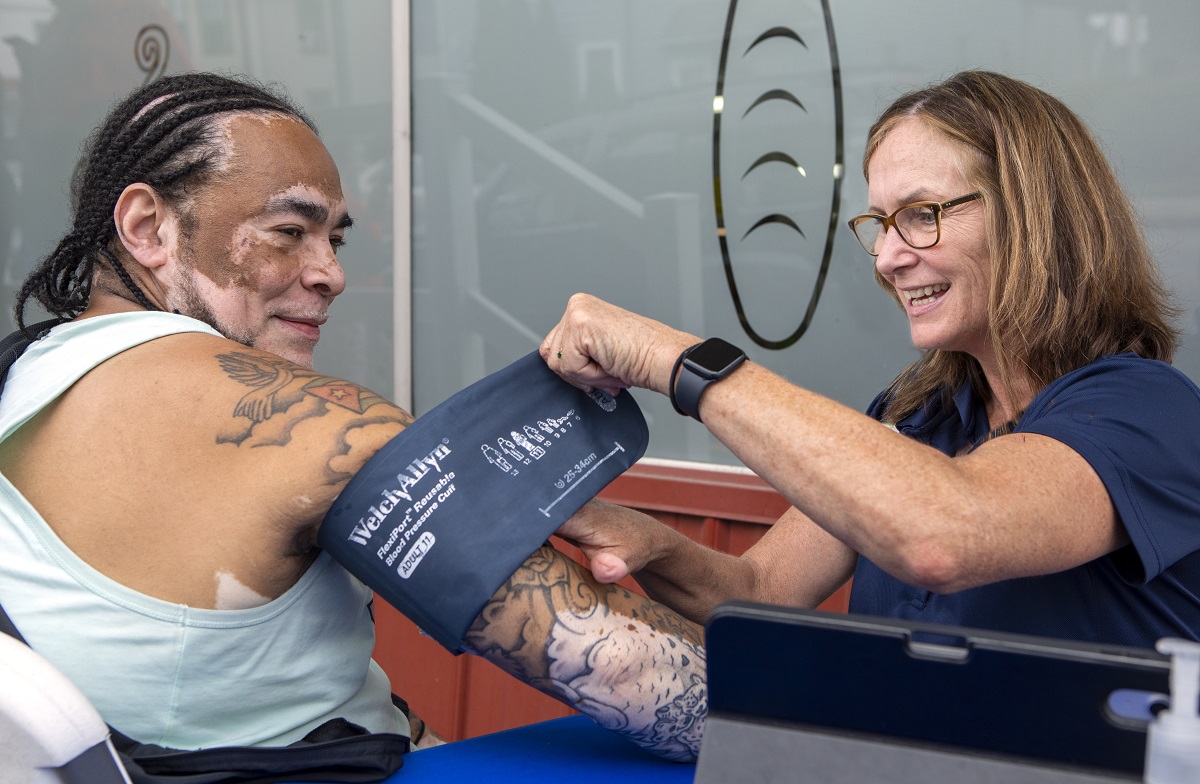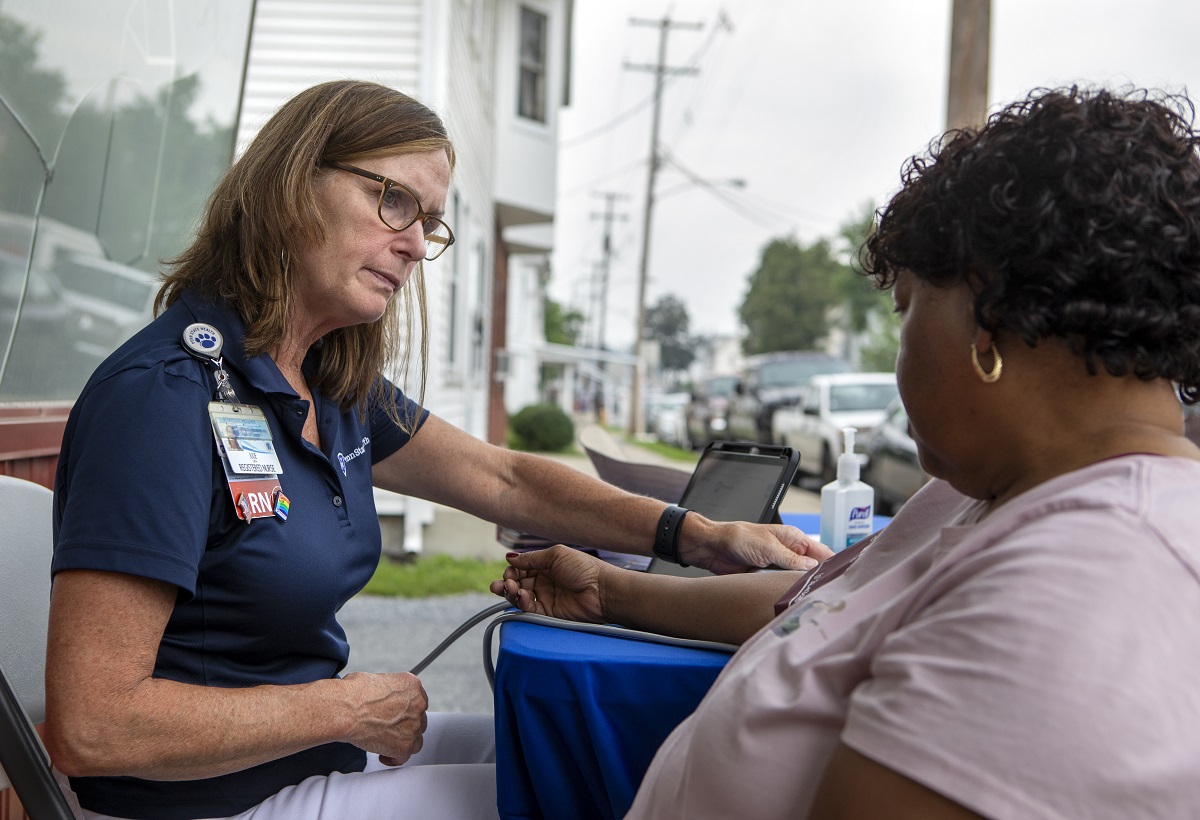A seat at the table: Pantries and Wellness Support program helps families find care

Jose Deleky had taken his daughter for a treat at the Caring Cupboard in Palmyra when he saw what looked like a doctor’s appointment happening next to the entrance.
He sent his little girl on ahead into the food pantry and waited his turn at a table piled with health care literature. Adele Dorsey sat on a chair next to the table and shared a laugh with Julie Groh, a community health nurse at Penn State Health, as Groh wrapped a cuff around the Palmyra woman’s arm and took her blood pressure.
That inflatable cuff is what caught Deleky’s attention. Years ago, a doctor in his hometown of Tampa, Fla., had prescribed him pills for hypertension. The pills gave him headaches so he stopped taking them. He hadn’t gone back to a doctor since, and he wondered if maybe a time bomb might be ticking away inside of him.
Groh discovered Deleky’s blood pressure was alarmingly high. She asked about the medicine and his insurance card, but he hadn’t brought either.
“Tomorrow is going to be a nice day,” Groh said as the man gave her a sheepish smile. “We could meet here and go through it together.”
“Meet here?”
“Sure,” she glanced over her shoulder at the two-story house on Railroad Street where the Caring Cupboard has helped feed families wrestling with food insecurity since 2006. Penn State Health nurses have positioned a table next to the front porch one evening a month ― when the line for groceries is longest ― for seven years.
“We could sit on the steps,” Groh said to Deleky, “and go through it.”
Deleky raised his eyebrows, startled. “What time?”
They settled on an hour after Deleky’s shift ended the next day and exchanged phone numbers.
The age of doctors making house calls might have ended more than half a century ago, but for Groh and the nurses who are part of the Penn State Health Pantries and Wellness Support (PaWS) program, consultations after hours, outdoors, on porch steps, on park benches or on curbs come with the territory.
At tables like the one outside the Caring Cupboard, Penn State Health nurses help clients who have had to prioritize putting food on the table every night over health. They find parents struggling so hard to care for their families they often set their own health care needs aside. And they help men and women caught in often labyrinthine systems of health care and insurance without compasses, and against whom the odds sometimes seem cruelly stacked.
“They’re just stuck in this cycle they can’t break,” said Lauren Zug, a nurse who volunteers at the table with Groh, “and their health care is often the thing that they stop first.”
With smiling faces and friendly voices, Groh and Zug are breaking that cycle. And they’re helping dozens of clients give the right importance to their own health.
‘The best job I ever had’
That help is sorely needed, according to a 2021 Penn State Health survey of six central Pennsylvania counties. Almost half of respondents said they can’t afford insurance. Even among those with coverage, one in 11 still did not receive care in the past year due to cost.
“This is the best job I ever had,” says Groh, who started in medicine as a nurse for the U.S. Army and eventually worked in a hospital setting before winding up as a community health nurse. “I love learning their stories. I love making a difference.”

Julie Groh, left, a community health nurse with Penn State Health, talks with Adele Dorsey about her blood pressure.
The Caring Cupboard is one of 11 different locations where PaWS conducts outreach. Groh and a team of Penn State Health nurses rotate visits to nine other food pantries, a senior housing facility and a farm stand. The locations cover five counties – Berks, Dauphin, Cumberland, Lebanon and Lancaster. They’re hoping to expand their outreach to more locations soon.
“Our PaWS program allows us to address health disparities by bringing care directly to the community through partnerships with local pantries and senior centers,” said Ashley Visco, Penn State Health’s community health director. “By providing vital health education and comprehensive cardiovascular testing, we bridge the gap between hunger and health, driving positive change and advancing equity to build a stronger, healthier future for all.”
In line ahead of Deleky, Dorsey’s blood pressure has also registered high. She isn’t surprised. She’s helping her husband deal with epilepsy.
Groh offers to send her links to mindfulness meditation to help ease some of the stress. She adds Dorsey’s blood pressure and contact information to a database, and she’ll follow up to see how she’s doing.
Regular clients
Repeat clients help give the program more power, Groh says. For one thing, she can check progress and see how a client improves or fails to improve over time. For another, the clients develop relationships that often lead to even more profound assistance from Groh and her partners.
“Sometimes, the blood pressure is just kind of an opening to find out what their needs are,” she said.
One visitor came to see her practically every week. He stopped by the table just to chat and never took her up on her offers to check his pressure. Then one day he emailed her. He’d lost his electrical service and needed help. Groh called the power company for him. One thing led to another, and now Groh is going to doctor’s appointments with him “because he needed an advocate,” she said.
It doesn’t always go that way. Sometimes clients pop up at a table, ready to share everything they need all at once. More often than not, getting to know one another takes time, but before long Groh finds herself calling utility companies, calling doctors and calling advocacy groups on their behalf. And sharing in their frustrations. “Sometimes, you hang up and you just want to cry,” she says. When she took the job, she was expecting to work 10 hours a week. As the program has grown, she averages about 30.
Shortly after Groh sets up shop for her three-hour stint at the table, Zug arrives to help. Zug just finished a shift for her full-time job – nurse practitioner in anesthesia preoperative unit at Penn State Health Milton S. Hershey Medical Center.
She’s volunteered for PaWS for a decade now.
“It’s a passion,” she said. “It gives the work a little more purpose. You feel like you’re making a difference.”
Like Groh, she’s discovered the people looking at her from the other side of the table often become very open and trusting – even more than in the hospital.
“I feel like clients are more willing to open up in this setting because it’s their community,” she said, “versus when they come into a doctor’s office. That’s can be a stressful situation.”
Often, Groh and Zug do little more than offer reminders and gentle nudges in the right direction. They find about half of the people they see have health insurance and many have received advice – or in Deleky’s case, a prescription – that they aren’t heeding.
Occasionally, they’ll call someone’s doctor from the table. Only once or twice during her tenure has she had to involve an ambulance for someone whose condition was so bad they needed immediate attention – though some clients have been close calls.
Old friends
Often, the relationships have the tone of old friends bumping into one another at the store. After the line had disappeared, a silver-haired woman named Rosemary High took the chair. Her arm was in a sling – she’d fallen at a local carnival and had broken it in a couple places.
Her granddaughter, Jen Fuhrman, who works as a scheduler at Penn State Heart and Vascular Institute, had driven her to the pantry. “I didn’t know what this was,” she said. “I saw Penn State Health and had to come see for myself.”
But High has been coming for years. She chats with the two nurses about her doctor and what had happened to her arm.
With the other arm, they test her blood pressure.
“It’s perfect!” Zug tells her.
“Well, that’s good to know,” High says. She stands and heads off into the store for her groceries. She’s gone through this routine many times, and not once have they told her they’ve discovered anything wrong.
“Oh yeah,” High said, “I like them guys. I come see them every time they’re here.”
Helping families overcome disparities in health care is part of the Penn State Health strategy to improve wellness and disease prevention. Learn more in the Penn State Health Community Health Needs Assessment and Implementation Plan.
If you're having trouble accessing this content, or would like it in another format, please email Penn State Health Marketing & Communications.
